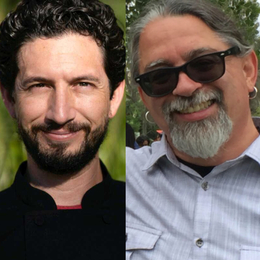Knowledge Base > Enrique C. Ochoa & Chris Rodriguez - Pull Up A Chair: Food, Labor and Climate Change

Enrique C. Ochoa & Chris Rodriguez - Pull Up A Chair: Food, Labor and Climate Change
This event was on
Wednesday, April 27, 2022 at 11:00 am Pacific, 2:00 pm Eastern
Join us for a conversation about Food, Labor and Climate Change with Professor Enrique C. Ochoa and Chef Chris Rodriguez. This is the third episode in the series called Pull Up a Cha… Read More.
Question:
Are we going to be able to afford food with this changing world and shipping costs?
— Susan Svensson
Answer:
This is I think this is a very real. situation for many people right now vast majority That takes us into a little bit more about you know, like our Global food supply chain now. Yeah, no, that's yeah, and I think Susan's question right is is right on the question really is and over the over the past again. This is been a large process in the making right from centuries. But over the past three decades in this period of more kind of hyper liberalization we call it neoliberalization, right or we might see this globalization that then all of a sudden as you said earlier Chris right people think well, we need to be able to eat whatever we want to eat whenever we want it as soon as we can which means then that that if it's not produced here on the land locally, but I need to get access to it. We have to bring it in and that might mean yes shipping it from Mexico going to Chile going to other places other parts of the country and all that costs right? Not just the price but but the larger costs what economists would call the Personalities right? But in reality is is the cost of it's It's the real cost of our food. Is that it comes from other places and that requires all kinds of other right resources to do it ones that kind of then are very damaging shipping, right? The shipping costs. The people are paying higher shipping prices in part because you have to be able to bring something should cost a lot. Because this kind of system that we've created this globalized food system is not sustainable. It's not sustainable the solution it was a solution to to world hunger right this globalization. And what is known as the Green Revolution to right introduce genetically modified seeds that are resilient to pests and right, you know the environment and so there's deep implications of this campaign that was that is tied into what you're what you're describing but it was supposed to solve world hunger, right and and instead it's it's done the complete opposite and has had devastating effects on local ecology. Um, you know the communities but also, you know bigger. Climate implications, right? Yeah. I would say right all those Tech the usage of those technologies that argue going back to the Green Revolution of the 40s and 50s that were that there's a population crisis quote unquote and we're not going to have enough food. And therefore we have to use technology to yeah, genetically modified food and variety of ways create new varieties to them produce a massive amount that will feed the world. I think that was a I don't think it was really about feeding the world. Right. I don't think that was the priority the priority was yes producing quite a bit. But but in the process allowing these larger corporations to get access to those lands right to Farmers lands to Campesino land and then to produce kind of this list large amount of cropping we won't see the three sisters anymore. We'll just see my East beam planted and then because the three sisters aren't there, right? There are not fixing Nitro beans are not nitrogen fixing the soil and fertilizing it so we have to then get right industrial fertilizer the other inner cropping that would also address as well the kind of the bugs that would be eating it are then constructed as pests and they need to be exterminated and that extermination that needs to come from chemical right chemical. Solutions and so in the so all along that bolsters, right some of these at one point rather small businesses agribusiness is in the US in Europe. They now have come right through the Green Revolution. They have come out as you know, multi-billion dollar corporations that have their hands in a lot of different aspects as as local knowledge is as peasants as Farmers have been pushed out and their knowledge is pushed out and in many guys reduce to workers right low page low paid workers and still in this possess, that's exactly it dispossessed in Spanish, right the word despojo hits it really strongly because it's dispossession, but it's kind of a violent dispossession where people of their Yeah of communal land and forced to migrate and like you said become workers workers to their own land. Um, but also, you know that no longer becomes a viable way of living and so there's sort of forced into the consumer Market as opposed to being producers with these meatballs. I want to make sure that we can touch on how communities are responding to to all of these drastic changes and and how it's it's these Technologies and these knowledge is of the meat of growing food for consumption as opposed to food for For export through agroa ecology and if we could begin to touch on that a little bit.
